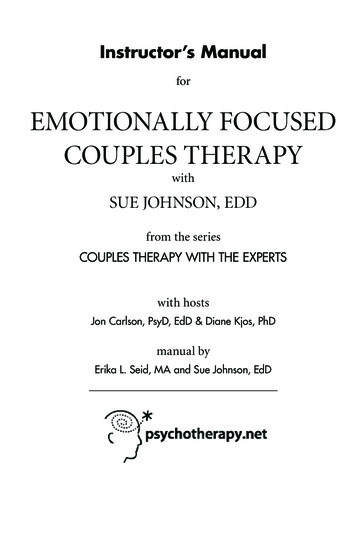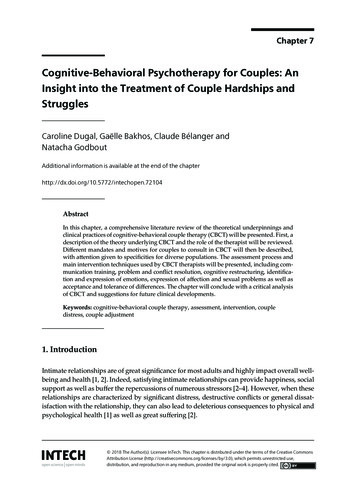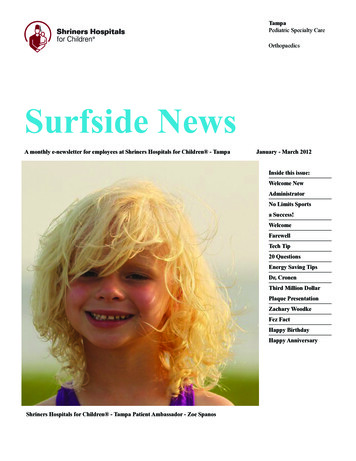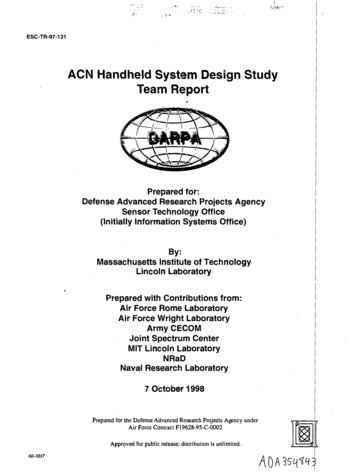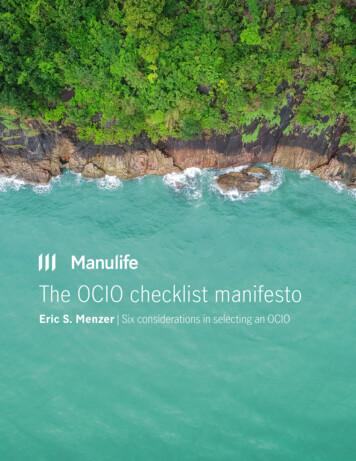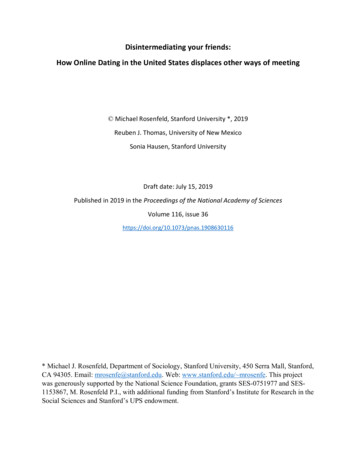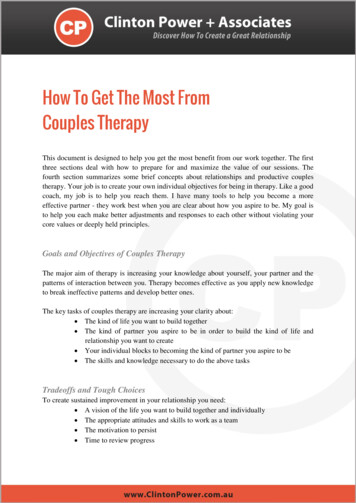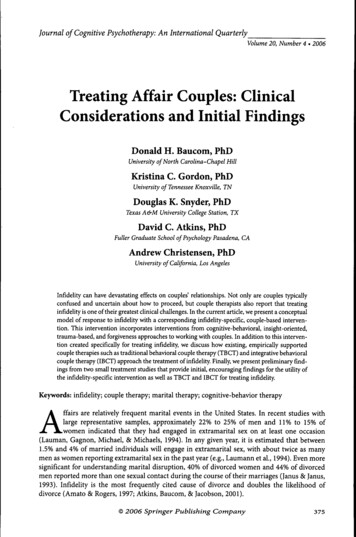
Transcription
Journal of Cognitive Psychotherapy: An International QuarterlyVolume 20, Number 4 . 2006Treating Affair Couples: ClinicalConsiderations and Initial FindingsDonald H. Baucom, PhDUniversity of North Carolina-Chapel HillKristina C. Gordon, PhDUniversity of Tennessee Knoxville, TNDouglas K. Snyder, PhDTexas A&M University College Station, TXDavid C. Atkins, PhDFuller Graduate School of Psychology Pasadena, CAAndrew Christensen, PhDUniversity of California, Los AngelesInfidelity can have devastating effects on couples' relationships. Not only are couples typicallyconfused and uncertain about how to proceed, but couple therapists also report that treatinginfidelity is one of their greatest clinical challenges. In the current article, we present a conceptualmodel of response to infidelity with a corresponding infidelity-specific, couple-based intervention. This intervention incorporates interventions from cognitive-behavioral, insight-oriented,trauma-based, and forgiveness approaches to working with couples. In addition to this intervention created specifically for treating infidelity, we discuss how existing, empirically supportedcouple therapies such as traditional behavioral couple therapy (TBCT) and integrative behavioralcouple therapy (IBCT) approach the treatment of infidelity. Finally, we present preliminary findings from two small treatment studies that provide initial, encouraging findings for the utility ofthe infidelity-specific intervention as well as TBCT and IBCT for treating infidelity.Keywords: infidelity; couple therapy; marital therapy; cognitive-behavior therapyAffairs are relatively frequent marital events in the United States. In recent studies withlarge representative samples, approximately 22% to 25% of men and 11% to 15% ofwomen indicated that they had engaged in extramarital sex on at least one occasion(Lauman, Gagnon, Michael, & Michaels, 1994). In any given year, it is estimated that between1.5% and 4% of married individuals will engage in extramarital sex, with about twice as manymen as women reporting extramarital sex in the past year (e.g., Laumann et al, 1994). Even moresignificant for understanding marital disruption, 40% of divorced women and 44% of divorcedmen reported more than one sexual contact during the course of their marriages (Janus & Janus,1993). Infidelity is the most frequently cited cause of divorce and doubles the likelihood ofdivorce (Amato & Rogers, 1997; Atkins, Baucom, & Jacobson, 2001). 2006 Springer Publishing Company375
376Treating Affair CouplesDespite the prevalence of this problem, many therapists are unable to adequately conceptualize infidelity or develop a treatment plan for this problem (Whisman, Dixon, & Johnson, 1997).At present, it is not clear whether the field needs an intervention specifically developed to treatinfidelity or whether existing couple therapy approaches can adequately assist couples experiencing such problems. The purpose of this article is to discuss these two possible approaches totreating infidelity, along with presenting preliminary data regarding the efficacy of these types ofinterventions. Because it is a newer intervention developed specifically to treat infidelity, we willfocus primarily on an approach developed by Gordon, Baucom, and Snyder (Baucom, Gordon,& Snyder, 2005; Gordon & Baucom, 1998; Gordon, Baucom, & Snyder, 2004) to help couplesrecover from an affair, integrating treatment strategies from cognitive-behavioral couple therapy,trauma interventions, forgiveness interventions, and insight-oriented couple therapy. In addition, we will discuss the application of behavioral and integrative behavioral couple therapy tothis specific clinical problem. Initial findings will be presented regarding the utility of these twoapproaches for treating infidelity—an infidelity-specific treatment and general couple therapy.EXTRAMARITAL AFFAIRS AS INTERPERSONAL TRAUMA:CONCEPTUAL AND TREATMENT IMPLICATIONSBoth clinical observations and empirical investigations demonstrate that the discovery of anaffair can have an overwhelming and devastating impact on a couple.' Injured partners oftenreport intense emotions that vacillate between rage toward the participating partner and inwardfeelings of shame, depression, overwhelming powerlessness, victimization, and abandonment(e.g., Abrahms Spring, 1996; Brown, 1991; Gordon et al., 2004; Lusterman, 1998; Pittman, 1989;Reibstein & Richards, 1993). Taken as a whole, many of these emotional, cognitive, and behavioral responses parallel the criteria for post-traumatic stress disorder. Therefore, conceptualizing theresponse to an affair as a reaction to an interpersonally traumatic event aids in the formulationof these difficult cases and the conduct of treatment (e.g., Baucom et al., 2005; Glass & Wright,1997; Gordon & Baucom, 1998).Literature on traumatic responses suggests that people are most likely to become emotionallytraumatized when an event violates basic assumptions about how the world and people operate(e.g., Janoff-Bulman, 1989). Several important assumptions that individuals commonly holdabout intimate relationships may be violated by an affair (e.g., that partners can be trusted, thatthe relationship is a safe place). The trauma literature also suggests that when these basic beliefsare violated, the injured person can significantly lose a sense that the future is predictable andexperience a loss of control. Hence, an extramarital affair is not merely a very negative event;instead, the injured person often experiences the shattering of core beliefs essential to emotionalsecurity. Common statements reflecting such turmoil include, "I don't know you; you aren't theperson I thought you were, and our relationship isn't what I thought it was" or "This just makesno sense; I can't understand how you could do this; I thought I could trust you." Given thisunpredictability and ruptured trust, the injured person typically cannot move forward with therelationship, even if the affair has ended. As long as injured partners do not have a clear sense ofwhy the affair occurred, they cannot trust their partners not to hurt them again; in the absenceof this understanding, the participating partners are likely to be seen as malicious people whosevery faces or voices may serve as stimuli for painful emotions such as anxiety, confusion, anger,depression, and shame.Given the conceptualization of affairs as interpersonal trauma, the literature on both thetraumatic response and interpersonal forgiveness can be helpful when considering how to conceptualize and organize an effective treatment. Treatments that arise from trauma theories generallyassist clients in focusing more clearly on the trauma, expose them to the memories of the trauma.
Baucom et al.377and help them reconstruct their basic schemata about how the world operates and regain a newsense of control over their outcomes (e.g., Resick & Galhoun, 2001). Interestingly, these themesare echoed in newly developed forgiveness-based interventions, which are therapeutic approachesbeginning to gain greater attention in mainstream psychological literature. Studies have indicatedthat forgiveness-based interventions aimed at helping the individual cognitively reframe the interpersonal betrayal and gain a greater understanding of why the trauma occurred are effective inincreasing participants' levels of forgiveness and in improving their levels of both individual anddyadic psychological functioning (e.g., Freedman & Enright, 1996; Worthington, in press).Similar to the trauma-based approaches, in most theories of forgiveness the primaryfocus of the process is on developing a changed understanding or attributions for why thebetrayal occurred and reconstructing a new meaning for the event (e.g., Enright & the HumanDevelopment Study Group, 1991; Gordon & Baucom, 1998; Rowe et al., 1989). Despite some differences, most theories of forgiveness are fairly consistent in their definitions of the end state offorgiveness, indicating three common elements: (1) gaining a more balanced view of the offenderand the event; (2) decreasing negative affect toward the offender, potentially along with increasedcompassion; and (3) giving up the right to punish the offender further.To date, both the trauma and forgiveness literatures have primarily emphasized interventions targeting individuals. Left largely unaddressed are how best to conceptualize the recoveryprocess and what specific interventions to pursue when dealing with interpersonal trauma froma couple perspective. To this end, it is useful to turn to two empirically supported couple therapyapproaches: cognitive-behavioral couple therapy and insight-oriented couple therapy.Cognitive-behavioral couple therapy (CBCT) builds on skills-based interventions ofbehavioral couple therapy targeting couple communication and behavior exchange by directingpartners' attention to explanations they construct for each other's behavior and to expectationsand standards they hold for their own relationship and for relationships in general (Epstein &Baucom, 2002). The structured, directed strategies offered within cognitive-behavioral interventions provide focus and direction to couples at a time when they are particularly needed.Before couples can explore the meaning of an affair for their relationship or reestablish trustand intimacy, they first need assistance in containing the emotional turmoil and destructiveexchanges that often characterize initial responses to the disclosure or discovery of an affair.Partners frequently need assistance in communicating feelings in a constructive manner andreaching intermediate decisions about how to set boundaries regarding involvement with theoutside affair person, how much information to share with children or extended family, and howto interact with each other. Moreover, in exploring factors that placed their relationship at risk foran affair, couples frequently need to improve their ability to negotiate basic changes in how theyinteract and manage daily challenges of their relationship. Cognitive-behavioral couple therapyis particularly well-suited to these therapeutic objectives; however, CBGT's general focus on thepresent and the future also leaves important gaps in dealing with such couples. Many couplesreport that they cannot merely move forward and put the affair behind them; they need someway to process the trauma that has occurred and some way to make sense of the past.Insight-oriented couple therapy (IOCT) offers therapeutic strategies designed specifically tohelp partners understand current relationship struggles from the perspective of partners' developmental histories. In IOCT, previous relationships, their affective components, and strategiesfor emotional gratification and anxiety containment are reconstructed with a focus on identifying for each partner consistencies in their interpersonal conflicts and coping styles across relationships (Snyder, 1999). Hence, insight-oriented strategies in couple therapy offer the potentialof helping partners gain a better understanding of both their own and each other's developmentalhistories, the role that their respective pasts have played throughout their marriage, and howindividual and relationship dynamics influenced by their pasts may have served as potential riskfactors contributing to the participating partner's extramarital affair.
378Treating Affair CouplesThese revelations of vulnerability can help the partners develop more empathy and compassion for each other. Furthermore, as will be demonstrated, as this increased understanding andinsight occur, it is placed within a cognitive-behavioral framework of developing a well-balancedset of attributions and resulting narrative for the event, along with a focus on what changes areneeded in the relationship for the future. Thus, an effective couple intervention for extramaritalaffairs might draw upon cognitive-behavioral interventions integrated with insight-orientedapproaches to provide a treatment strategy that balances the past, present, and future with anincreased emphasis on affect and developmental factors. OVERVIEW OF INFIDELITY-SPECIFIC TREATMENT MODELGordon and Baucom (1998) developed a stage model of forgiveness that parallels a response totrauma including three major stages in the forgiveness process: (1) dealing with the impact;(2) a search for meaning, or understanding of why the affair occurred; and (3) recovery, ormoving forward. The treatment builds on this model of forgiveness and integrates cognitivebehavioral, insight-oriented, forgiveness-based, and trauma-based approaches to relationshipdifficulties. The treatment model includes three phases of treatment, each of which is directlytied to a stage from the authors' forgiveness model.Given that the first stage of dealing with an affair involves addressing the impact of the event,the treatment components for Stage 1 are primarily cognitive-behavioral and directly target problems that arise from the immediate impact of the affair (e.g., emotional dysregulation, depression,the need to express feelings of anger and hurt, and damage control where necessary). The goal ofthe second stage is to help the couple explore both proximal and distal factors that contributedto the participating partner's decision to engage in the affair; consequently, treatment strategies in Stage 2 of the therapy are more insight-oriented and incorporate cognitive restructuringstrategies, particularly with regard to attributions for the affair. Finally, in Stage 3, the couple isencouraged to (1) address the issue of forgiveness, (2) consolidate what they have learned abouteach other, (3) reexamine their relationship, and (4) decide how or whether they wish to continuetheir relationship in the future. At this time, the couple begins work on either improving theirrelationship in the here and now or initiating termination procedures. The components and challenges of each stage of treatment are described in further detail later in this article. Although thisstage model is presented in a linear fashion, our experience is that some individuals demonstratea mixture of symptoms from various stages at a given time and might return to earlier stages afterprogressing through a later stage (e.g., reexperiencing Stage 1 phenomena after a flashback laterin the process). Thus, the clinician should use the following recommendations as guidelines fortreatment that can be adapted flexibly to meet a given couple's needs.STAGE l: ADDRESSING THE IMPACT OF AN AFFAIRAssessmentThe first stage of the treatment encompasses assessment and management of the affair's impact.Using common assessment strategies for couples (Epstein & Baucom, 2002; Snyder, Heyman,& Haynes, 2005), basic aspects of couple functioning relevant to all couples should be assessed(e.g., satisfaction, communication skills, and commitment level). Furthermore, a conjoint sessionfocused on gathering information about the couple's relationship history should be conducted,with specific attention paid to events and experiences leading up to the affair. In addition, thetherapist should gather information about what the injured partner kndws.about the affair, howthe affair came to light, and how the couple is currently dealing with its impact, looking at bothstrengths and weaknesses in the couple's current functioning.
Baucom et al.379Individual assessment sessions, one for each partner, also are beneficial. In addition to fiirtherinformation about the status of the affair and each person's current commitment to the primarycouple relationship, the focus of the individual session is on obtaining an individual history for eachpartner, paying particular attention to aspects of his or her development that may have influencedactions surrounding the affair. Examples of these issues may be patterns in past relationships, beliefsabout marriage, and parental history and attitudes toward marriages. These sessions also allow thetherapist to explore hidden agendas (e.g., the participating partners goal of leaving the marriage) andassess further for any potentially problematic areas, such as suicidality or violence. Therapists shouldbe careful about setting boundaries of confidentiality for these sessions as they may be left holdingsecrets confided by one member of the couple that can be detrimental to the therapeutic alliance.This problem can be avoided by informing the partners that information raised in individual sessions may need to be addressed in the conjoint sessions, but the therapist will always discuss how andwhen to do this with the individual first.Therapeutic Components of Stage 1After completing the assessment, the therapist should have a good understanding of how the coupleis functioning. The therapist should then provide the couple with (1) the therapists initial conceptualization of what may have led up to the affair, (2) a summary of what problems the couple is currently facing in their relationship and why they are experiencing these problems, and (3) a treatmentstrategy. Then the couple should be given an explanation of the stages of the recovery process andthe response to trauma conceptualization described in the introduction. In addition to assessmentand feedback, the first stage of therapy has five basic components: (1) boundary setting, (2) self-caretechniques, (3) time-out and venting techniques, (4) emotional expressiveness skills and discussionof the impact of the affair, and (5) coping with flashbacks.Boundary Setting. When a couple feels out of control and in crisis, providing healthyboundaries can help to create some sense of normality and predictability. Because their ownrelationship has become dysregulated, the therapists guiding the couple in setting boundaries orlimits on how the partners interact with each other can be helpful. The injured partner often isgreatly distressed about the outside person who had an affair with the participating partner. Thisintrusion of a third party into their lives is a major factor creating anxiety and a lack of safety.Therefore, setting strong and clear boundaries on interactions with the outside, third person isvery important.First, the couple's own relationship must be targeted to create a sense of safety in the relationshipand minimize further negative effects on the couple. A major problem confronting many couplesdealing with the impact of an affair is the fact that the negative emotions engendered by the betrayalmay flood into many aspects of their functioning. Even areas within the marriage that were notproblematic prior to the affair are likely to be affected by the increase in negativity in the marriage.For example, a couple who once prided themselves on their ability to parent well together may fmdthemselves arguing bitterly in front of their children. Given that the couple is likely to experienceintense and frequent conflict, they are likely to need immediate assistance from the therapist in setting limits on their negative interactions. For some couples, this involves making agreements aboutwhen, how often, and what aspects of the affair they will discuss. Otherwise, some couples reportthat they spend hours each day discussing the affair, often repeating the same conversations, typicallyresulting in negative, hurtful interactions.Using directed problem-solving or decision-making strategies (Epstein & Baucom, 2002),the therapist should help the couple develop their own limits and boundaries for this problematicstage. It is important to emphasize that some of these solutions might be temporary ones primarily designed for so-called damage control. The participating partner may have to agree to somebehaviors that would not be typical in a marriage but that are needed in the short term to help theinjured partner regain a sense of control or safety and to demonstrate the participating partner's
380Treating Affair Couplesremorse for the affair. For example, if a common cause of arguments is a wife's anxiety regardingher husbands whereabouts, then her husband may agree to be zealous in checking in with his wifeuntil some trust or security has been reestablished.Second, in order for the injured partner to feel safe enough to engage in the therapeuticprocess, it is important for the participating partner to set strong boundaries on interactions withthe outside third party. This is most easily obtained if the participating partner agrees to end therelationship with the third person with no further contact. This absolute termination, however, issometimes difficult to create for a variety of reasons. Some participating partners are unwilling toterminate all interaction with the outside person when the affair is discovered; sometimes logistics makes it impractical to have no interactions, at least immediately (e.g., when the participatingpartner and third person work together); and at times, the outside person continues to contactthe participating partner, despite being told not to do so. Because rebuilding trust is a crucialpart of the therapeutic process, the therapist encourages the participating partner to be honest instating what boundaries he or she is willing to set with the outside person at present and how thatwill be carried out, along with agreements for how the injured partner will be informed of contactwith the outside person. It is extremely important that the couple eventually set limits togetheron interactions with the outside partner, however, particularly if the outside partner insists onintruding into the relationship. From our experience, it is clear that continued interactions withthe outside partner can have the effect of retraumatizing the injured partner and eroding theprogress that the couple is able to make.Self-Care Guidelines. As noted earlier, the emotional and cognitive sequelae of affairsoften involve feelings of anxiety, depression, shame, and lowered self-esteem. Consequently,another major target for this stage of therapy involves helping both partners to take better careof themselves in order to have more emotional resources to use as they work through the aftermathof the affair. The current treatment offers basic self-care guidelines that encompass threeareas: (1) physical care, including such aspects as eating well, sleep, decreased caffeine, andexercise; (2) social support, with careful attention paid to what is appropriate to disclose to othersand what is not; and (3) spiritual support, such as meditation, prayer, and talking with spiritualcounselors if consistent with the partner s belief system.Time-Out and Venting Techniques. In light of the intense negative interactions between thepartners at this stage in the process, most couples need strategies that allow them to disengagewhen the level of emotion becomes too high. Time-out strategies are introduced, and partnersare instructed on how to recognize when one needs to be called and how to do so effectively. Inaddition, instead of using time-outs to fume and plan a counterattack, the partners are instructedin how to use the time-outs constructively; for example, to vent their tension through nonaggressive physical exercise or to calm themselves through relaxation strategies.Discussing the Impact of the Affair. A common need for an injured partner is to express to theparticipating partner how she or he has been hurt or angered by the affair. It is likely that this needserves both a punitive and a protective function. By its punitive qualities, this discussion serves asa way to communicate that what happened was wrong and to ensure that the participating partneralso feels as much discomfort as possible as a result of his or her actions. Often these interactionsbetween the partners are rancorous and complicated by feelings of anger and guilt on the part ofthe participating partner. Frequently, the participating partner also has feelings of bitterness aboutan earlier hurt or betrayal in the marriage, which interferes with his or her ability to sympathizewith the injured partner's feelings of betrayal. As a result, the injured partner is not likely to feelheard and may increase demands or comments, precipitating a negative interaction cycle betweenthe partners.The current treatment seeks to interrupt this cycle through three means. First, the couple istaught to use appropriate emotional expressiveness skills for both speaker and listener to help theinjured person be more effective in communicating feelings and the participating partner to be
Baucom et al.381more effective in demonstrating that she or he is listening (Epstein & Baucom, 2002). Second, thecouple is given a careful conceptualization of why this step is necessary. The participating partnermust understand that his or her own perspective of the affair will most likely not be effectivelyunderstood by the injured partner unless the injured partner is first able to experience that theparticipating partner truly understands and is remorseful for the effect of his or her actions onthe injured person and the relationship. Finally, the injured partner is encouraged to write a letterexploring his or her feelings and reactions to the affair, which is first given to the therapist. Afterfeedback from the therapist, the letter is then revised and read to the participating partner. Thisprocess allows injured partners to explore their reactions in a calmer manner and then enablesthem to take time to express their feelings in ways that are not attacking or abusive and are morelikely to be heard by the participating partner.Coping With Flashbacks. A final but critical component in Stage 1 is the explanation of socalled flashback phenomena and the development of a plan for how to cope with them. As notedearlier, the reaction to an affair strongly parallels the traumatic response, and both partners arelikely to encounter reexperiencing phenomena. For example, a wife may discover an unexplainednumber on a telephone bill, which may then remind her ofthe unexplained telephone calls during the affair and trigger a flood of affect related to her husbands affair. If the husband is notaware of this sequence of events, his wife's emotions may appear inexplicable, which in turn maycause him to question the progress they may be making in recovering from the affair. In working with couples, we explain the concept of a flashback in this context and how to address suchexperiences. For example, the therapist may explain:When one person has had an affair it tends to make the other person extremely sensitive andreactive to things that directly or even indirectly remind them ofthe traumatic event That's whya strange number on the phone bill or being at a restaurant where your partner ate with the otherperson can so easily set you off. What we think may be happening is that the person has startedto associate certain experiences, memories, objects, and so forth with the traumatic event Thiskind of association happens to us every day. Have you ever smelled something and then immediately were reminded of a past experience? Like smelling chalk dust and immediately thinkingof elementary school? "Innocent" objects, smells or sounds may immediately remind a partner ofan affair and then produce strong emotional reactions to it We call these kinds of experiencesflashbacks. Does this make sense in terms of what you're describing has been happening?We often provide a handout with a set of guidelines for addressing flashbacks. Withinthese guidelines, couples are taught to differentiate between upsetting events that reflect current inappropriate behavior versus events that trigger feelings, images, and memories from thepast. See Snyder, Baucom, and Gordon (in press) for a detailed description of how to handleflashbacks.STAGE 2: EXAMINING CONTEXTTherapeutic ComponentsExploring Factors Potentially Contributing to the Affair. After the emotional chaos or emotional distance from Stage 1 has been addressed, then the second stage of the treatment focuses onhelping the couple explore and understand the context of the affair; that is, developing a realistic,well formulated set of attributions for the infidelity. This is a crucial part ofthe therapy and typicallyoccupies the greatest amount of time. Given that basic assumptions about both partners and theirrelationship have been disrupted by the affair, the couple cannot move forward until they have amore complete and thoughtful understanding of why the affair occurred. Such attributions or explanations set the stage for helping the couple decide whether they want to maintain their relationship,what needs to change, or if they should move forward by ending their relationship.
382Treating Affair CouplesThe factors discussed in Stage 2 include: (1) aspects of the relationship such as difficultycommunicating or finding time for each other; (2) external issues such as job stress, financialdifficulties, or conflicts with in-laws; (3) issues specific to the participating partner such as hisor her beliefs about marriage or his or her social development history; and (4) issues specific tothe injured partner such as his or her developmental history or his or her relationship skills. Thislast point is likely to be most difficult for the couple, given that it may appear to be blaming thevictim. At this point, the couple needs to understand an important distinction between contributing to the context of the affair versus responsibility for engaging in the affair. In this treatment,participating partners are always held responsible for their choices to have the affair, but it isimportant to understand the context within which they made that decision (Allen et al., 2005).These sessions exploring the context of the affair typically are conducted in two ways.Depending on the couples level of skill and their motivation to listen to and understand eachother, these sessions can take the form of structured discussions between the partners
recover from an affair, integrating treatment strategies from cognitive-behavioral couple therapy, trauma interventions, forgiveness interventions, and insight-oriented couple therapy. In addi-tion, we will discuss the application of behavioral and integrative behavioral couple
